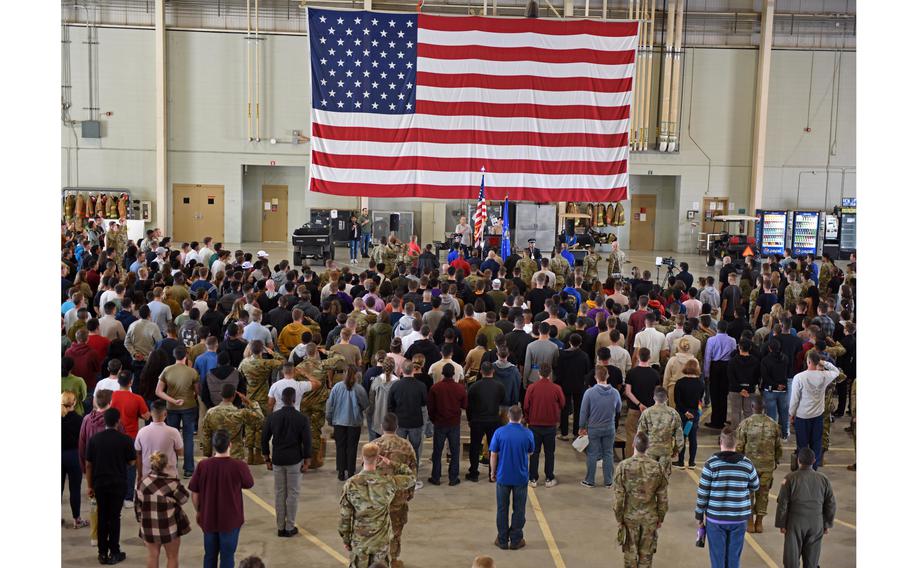
Members of the 17th Training Wing gather in the Louis F. Garland Department of Defense Fire Academy high bay, for the first Diversity, Equity, and Inclusion Day event, Goodfellow Air Force Base, Texas, Oct. 28, 2022. (Sarah Williams/U.S. Air Force)
I proudly served in the U.S. Army for over two decades. As a medic deployed to the front lines of Afghanistan, my loyalty to America was unquestionable.
I was awarded a Bronze Star Medal and became the first Sikh soldier in a generation granted permission to wear my turban and beard — symbols of my faith — marking a significant victory for religious freedom and diversity within our armed forces.
For years, my dedication to America was reciprocated with respect and inclusion. Today, however, under President Donald Trump’s influence, the culture within our military is shifting dangerously away from acceptance and inclusion toward intolerance and exclusion.
Recent events vividly illustrate this alarming trend. As recently reported, the U.S. Air Force Academy initially refused to accommodate Ramadan for Muslim cadets, reportedly instructing them to either break their sacred fast or endure rigorous training without food or water. According to the Gazette, an exemption requested by the Muslim chaplain was outright denied in February, forcing cadets to choose between their faith and military duties.
Such actions send an unmistakable, chilling message to non-Christian service members: your beliefs no longer matter here.
And make no mistake, the armed forces are at their best when they embody America’s greatest strength — a diverse tapestry bound by freedom, ambition and patriotism.
This erosion of diversity, equity, and inclusion (DEI) is not limited to the military. Federal cuts to DEI programs initiated by Trump have rapidly spread, impacting small-town colleges and major corporations alike. Now, DEI itself is under siege, threatening the very essence of American progress and unity.
Let us be clear: DEI is not a novel concept or fleeting trend. It is the cornerstone of our constitutional heritage. America’s strength has always come from our diversity — individuals of every faith and ethnicity working side by side, united by shared ambitions, freedoms and patriotism. This pluralism, safeguarded by the First Amendment, has propelled our nation forward for nearly 250 years, fostering innovation, economic power and unparalleled military readiness.
“We must all hang together,” said Benjamin Franklin, signing the Declaration of Independence in 1776, “or, most assuredly, we shall all hang separately.”
Today, that wisdom resonates more urgently than ever. Divisive policies and rhetoric from this new Trump era risk fragmenting the cohesive bonds essential to our military’s effectiveness and morale, potentially causing a catastrophic exodus of talented, dedicated servicemembers precisely at a time when threats from global adversaries such as China and Iran demand our unified strength.
Worse still, the divisive politics of the Trump White House sow resentment among everyday Americans, pitting neighbor against neighbor.
Trump publicly proclaims support for religious liberty, as he did in his March 3 message to American Muslims, calling it “an integral part of the American way of life.” Yet, actions speak louder than words. Would Christian or Jewish cadets have faced such stark ultimatums as those given to Muslim cadets at the Air Force Academy? I fear not.
History teaches us that intolerance is never content targeting just one group — it spreads, eroding rights until no one is safe. I witnessed firsthand in Afghanistan what happens when authoritarianism reigns unchecked. But even there, hope prevails through courageous advocates of pluralism and human dignity.
Under the leadership of Dr. Mohammad bin Abdulkarim Al-Issa, the Muslim World League — the world’s largest Islamic nongovernmental organization – has taken powerful steps toward inclusion with initiatives like the Makkah Charter, a groundbreaking framework for religious tolerance and mutual respect. And recently, it organized an International Conference on Girls’ Education in Muslim Communities, bringing Islamic scholars and activists together to combat extremism.
It speaks volumes — and should deeply trouble us — that global Islamic institutions currently display a greater commitment to inclusion and human rights than our military.
Our armed forces have fought and died to combat dictatorships and intolerance abroad. Now the fight to uphold these American values rages within our own ranks. We cannot allow America’s greatest strength — our pluralism and diversity — to unravel through neglect or hostility.
The military I proudly served must recommit to embracing the very diversity that makes America exceptional. We must urgently restore and expand DEI initiatives, affirming clearly that religious minorities will always have a respected place among America’s defenders.
Our nation’s security, strength and soul depend upon it.
Dr. Kamal S. Kalsi is the chief medical officer of Victory Medical Institute and White House AANHPI Commissioner. He is an emergency medicine physician and military leader with over two decades of service in the U.S. Army. He retired in 2021. The views expressed in this column are solely those of the author and do not represent the official policy, position, or endorsement of the Department of Defense, the U.S. Army, or any agency of the U.S. government.